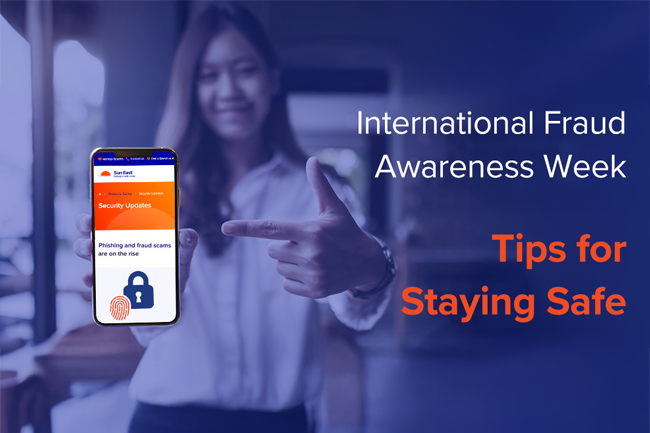Staying safe from scams starts with awareness and action. During International Fraud Awareness Week, Sun East is empowering members to protect their accounts, money, and personal information with proven fraud prevention habits.
According to the Federal Trade Commission (FTC), Americans lost more than $12.5 billion to fraud in 2024, the highest amount ever reported. By taking a few proactive steps, you can make yourself a much harder target for scammers and keep your finances secure.
Follow these nine tips and prevent your personal information and finances from falling into the hands of fraudsters!
1. Verify Before You Click or Respond
Fraud attempts often arrive by email, text, or phone and can look surprisingly legitimate. Scammers spend a lot of time and effort creating convincing professional looking emails, text messages, and scripts.
According to the FBI, they even steal logos and images from legitimate websites and use similar looking URLs and email addresses to make their efforts more convincing.
✅ What to do to protect yourself:
- Never click on unexpected links or attachments.
- Check the URL (but don’t click the link) and see if they match official URLs from the company allegedly communicating with you.
- Call us directly at 610-485-2960 to confirm any suspicious request.
2. Always Confirm Who You’re Talking To
Scammers are good at pretending to be people they are not and will sometimes pose as trusted institutions, even as your credit union, and may claim your account is at risk or urge you to move money to a “safe” account that belongs to them.
If a message asks you to “verify your account,” “click to unlock access,” or “confirm a payment,” take a pause! This is an example of phishing, where scammers pretend to be from trusted companies or people you know and reach out through email, text, or phone calls to trick you into sharing personal details or clicking unsafe links.
✅ What to do to protect yourself:
- Hang up and call Sun East directly at 610-485-2960 if you receive a message that doesn’t seem right.
- If someone claims to be a friend or family member, contact them through another known method before doing anything.
- Create a shared “safe word” or phrase with close family and friends to guard against AI-generated voice scams and impersonation attempts.
3. Treat Every Check Like Cash
Fake and altered checks can be extremely convincing. As the FTC explains, in many scams, criminals send you a bogus check and then ask you to send part of the money back before the check bounces. When it turns out to be fake, the funds you returned came out of your own account.
Because funds from a deposited check may appear in your account before the check has fully cleared, it can create a false sense of security. Banks and credit unions are required to make funds available quickly, but if the check later turns out to be fake or altered, you’re responsible for the amount you used or sent back.
That’s why treating every check like cash helps protect you from being left on the hook for money that was never real in the first place.
✅ What to do to protect yourself:
- Wait for deposited funds to fully clear before using or transferring them.
- Decline any “overpayment” or “refund” request from someone you don’t know.
- Be cautious if someone wants to send you a check but asks you to send money back.
4. Inspect ATMs and Payment Terminals
Card skimming is a common tactic criminals use to steal your card number and PIN without your knowledge. Skimmers are small devices placed over or inside card readers at ATMs and payment terminals.
They’re designed to blend in with the machine, so at a quick glance they often look completely legitimate. Criminals may also install tiny cameras or false keypads to capture your PIN.
Because these devices can be difficult to spot, taking just a few seconds to look over the machine before using it can make a big difference in protecting your account and preventing unauthorized transactions.
✅ What to do to protect yourself:
- Be cautious with ATMs in high-traffic or tourist-heavy areas where skimming is more common.
- Shield the keypad with your hand when entering your PIN to block hidden cameras.
- Make sure you’re using a card with chip technology, which provides more security than magnetic stripes.
- Report any machine that seems unusual like loose parts, an unfamiliar screen, bulky attachments, or anything that doesn’t look like it belongs.
5. Double-Check Before You Send Money
Peer-to-peer (P2P) payment apps like Zelle®, Venmo, and Cash App make it easy to send money instantly. But once a payment is sent, it can’t be reversed. Scammers take advantage of that speed.
According to Interpol, scammers may impersonate friends, coworkers, family members, or even your credit union to create a sense of urgency, claiming they “need help right now” or that there’s a problem with your account.
These scammers use social engineering to prey on your emotions and get you to make rash decisions like clicking links or sending money to a friend or relative. They rely on pressure, panic, and quick reactions to trick you out of your money.
Taking a moment to verify the request can prevent money from going straight into a scammer’s hands.
✅ What to do to protect yourself:
- Use our secure Pay-A-Person feature to send money to anyone in your contacts list. Recipients don’t need to be Sun East members for you to send money to them!
- Verify any request through a known phone number, in person, or through another trusted method before sending funds.
- Treat P2P payments like cash. Send money only to people you personally know and trust.
- If someone is urging you to act quickly, slow down. Urgency is one of the biggest red flags of a scam.
6. Research Before You Invest or Donate
Investment schemes and donation scams often rely on promises that seem impressive or urgent, but if an opportunity sounds too good to be true, it usually is. Fraudsters may pose as financial advisors, charity workers, or even supportive online friends or romantic interests.
According to the FTC, they build trust over time, then pressure you to send money, cryptocurrency, or gift cards. These scams can be highly convincing and emotionally manipulative, especially when tied to fake causes or personal stories designed to make you feel compelled to help.
Doing a little research upfront can protect you from losing money to a fraudulent organization or individual.
✅ What to do to protect yourself:
- Research investments and charities on verified sites such as CharityNavigator.org.
- Be skeptical of anyone who promises guaranteed return; no legitimate investment can offer that.
- Avoid anyone asking for payment in cryptocurrency, wire transfers, or gift cards; these methods are common red flags.
- Trust your instincts. If something feels off or unusually urgent, walk away.
- Never send money to someone you haven’t met in person and verified independently.
7. Slow Down and Spot the Red Flags
Scammers rely on emotion to override reason. They know that fear, excitement, or urgency can make even the most cautious person act quickly without thinking things through. Whether it’s a message claiming your account is locked or a call warning that a loved one is in trouble, the pressure is intentional. Slowing down gives you the chance to notice the small details that give scams away.
Taking an extra minute to assess a situation can be the difference between staying safe and becoming a victim.
✅ What to do to protect yourself:
- Look closely for misspelled email addresses, unfamiliar senders, or URLs that are slightly altered to mimic legitimate sites.
- Question any unexpected request for personal information, payments, or account access, even if it appears to come from someone you know.
- Remember: urgency, threats, and pressure are major red flags. Legitimate organizations won’t demand immediate action or attempt to scare you into responding.
8. Strengthen Your Everyday Security Habits
Fraud prevention isn’t just about reacting to threats; it’s about building strong habits that make your accounts harder to compromise in the first place. Simple practices like managing passwords, keeping your devices updated, and staying aware of how you connect online create a safer foundation for all your digital activity.
The stronger your daily security routines, the less likely scammers are to succeed.
✅ What to do to protect yourself:
- Turn on account alerts and multi-factor authentication (MFA) to add an extra layer of protection.
- Use strong, unique passwords for each account and update them regularly to reduce the risk of unauthorized access.
- Avoid public Wi-Fi when accessing financial information. If you must use it, connect through a trusted VPN to keep your data encrypted.
- Keep your contact information updated with Sun East so we can reach you quickly if there’s unusual activity on your account.
9. Act Fast if You Suspect Fraud
Speed matters when stopping fraud. If something feels wrong, take action immediately.
✅ What to do right away:
- Call Sun East at 610-485-2960
- Lock your card or account through online banking.
- Report scams at reportfraud.ftc.gov.
- Keep screenshots, receipts, and records for investigators.
- Quick action gives you the best chance to recover your funds and stop further losses.
Sun East Is Here to Help
Staying safe online is a team effort, and every smart choice you make adds another layer of protection for you and for the entire Sun East community. Fraudsters are constantly evolving their tactics, but by slowing down, verifying information, practicing strong security habits, and recognizing red flags, you greatly reduce your risk.
Sun East is always here to support you, answer your questions, and guide you through anything suspicious or uncertain. If you ever receive a suspicious call, text, or email claiming to be from Sun East, do not respond. Instead, contact us directly at 610-485-2960 or visit your nearest branch.





